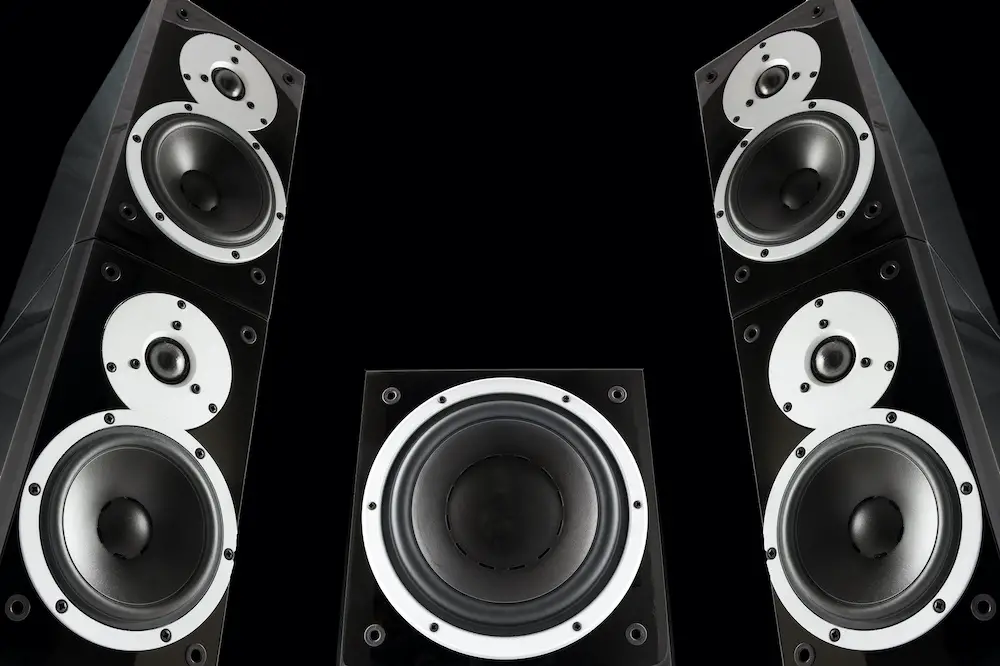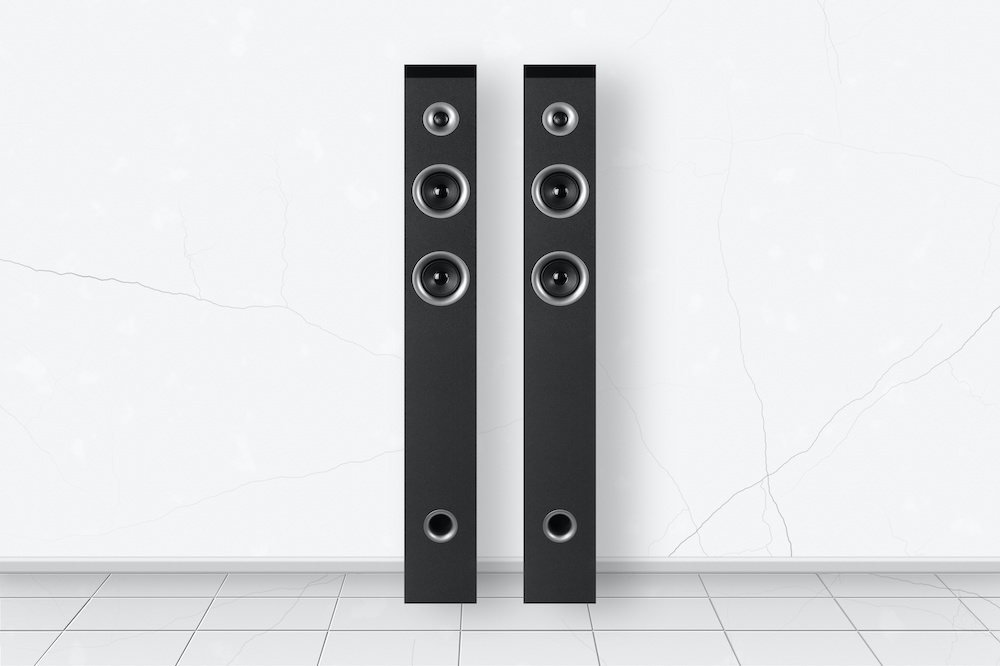You might want a straight answer to the question, “Are tower speakers better than bookshelf types?” but that’s not possible.
That’s because it’s not about the quality that distinguishes both types. It’s their use and your needs.
For example, all other things being the same, if you have a lot of floor space, a tower is better. They are also better as theater speakers.
However, bookshelf speakers also have a wide range of benefits, such as being compact and cheap.
It goes without saying that the type of speaker you want depends on many factors you must know before buying one or the other.
Let’s compare the two types of speakers and see the suitable uses for both types while keeping in mind the differences between bookshelf and tower speakers.
What Are Tower Speakers?
Floorstanding or tower speakers are larger and don’t need a separate stand.
You can just place them on the ground, and they are ready to play.
They have better sound quality than smaller desktop speakers but cost more.
Also, you’ll need an external amplifier for towers, as they usually come as passive speakers.
They are better suited for home theater and look elegant and beautiful on the sides of the screen.
An example of a good quality tower speaker is Polk Audio AM5205 which has two cone woofers and a dome tweeter.
What Are Bookshelf Speakers?
Bookshelf models are usually 2-way speakers, but 3-way speakers are also available such as Sony SSCS5.
They are smaller in size and usually have more advanced features.
Most models are passive speakers, but powered models are also available. They produce a balanced sound for gaming, TV sets, and small rooms.
You can find a typical pair of bookshelf speakers at less than $500, making them an excellent option for students.
Newer models of bookshelf speakers now have multiple connectivity options, such as Bluetooth, USB, and optic.
These options make them ideal for connecting to laptops, iPhones, iPads, and Androids.
When Are Tower Speakers Better?
When are floor-standing or tower speakers better than bookshelf speakers?
When You Have Space Issues
Tower speakers are better for you if space is not an issue and you are not buying a sub.
Some people argue that since the tower speakers need more space, they are not easy to handle, but there are caveats.
A tower speaker can work well without a sub which you’ll need with desktop speakers, hence more space requirement.
For a better listening experience, you also have to mount them on a stand which takes up space.
That means tower speakers can be a better choice in terms of size and space.
Yes, if you don’t have vertical space and a lot of horizontal space, you can go for bookshelf speakers with a sub.
If you have a large home theater or you need a speaker for a medium-sized hall, tower speakers are better for you.

When You Need an All-In-One Solution
A full-range tower speaker has two drivers for bass, a midrange driver, and a tweeter.
In some cases where you don’t want too much bass, you can make do without a subwoofer.
Towers are high-performance speakers which can move more air around as they have more room in their cabinet, thus producing more bass than bookshelf speakers.
On the other hand, bookshelf speakers need help producing a similar sound quality. You’ll need a bass subwoofer with them.
If you try to get a similar sound from bookshelf speakers, the setup becomes too complicated with wires and many components.
These factors make tower speakers ideal speakers for a standalone home theater.
When You Want More Range
A floor-standing speaker can play highs and lows much more effectively and clearly than a bookshelf speaker.
It can produce quality sound independently, while desktop speakers need help if you want them to play loud sounds.
That’s because tower speakers have a larger size and more drivers to cover a wide range of frequencies.
You can indeed set up desktop speakers to sound the same or even better by coupling them with a sub, but the hassle is still there.
When You Need Better Power Handling
The factors such as maximum volume, frequency range, distortion, bass, treble, and resonance are different for different sizes of speakers.
Since the tower speakers have bigger sizes, they can incorporate more and larger drivers, larger tweeters, and space for airflow.
The power handling capacity of bookshelf speakers and tower speakers is also different.
For example, the Klipsch RP-260F tower can handle a continuous power of 120 Watts and a peak of 500 Watts.
Meanwhile, the Klipsch RP-150M bookshelf can handle 75 Watts continuous and 300 Watts peak power.
The same applies to other parameters where a tower speaker can do better than a standalone bookshelf pair.
When You Don’t Have Shelves and Extra Stands
Bookshelf speakers are great for tables and shelves, but what if you don’t want them on a shelf? You must buy a stand to bring them to your ear level.
Tower speakers, on the other hand, do not need a stand; you can just unpack them and place them wherever you want.
For bookshelf speakers, you might need some shopping. You also have to find the specific stand for the model and brand.
However, even with the stand, the bookshelf speakers will not bring you the best mix of bass and treble as the tower ones.
When Are Bookshelf Better Than Towers?
Bookshelf speakers also have advantages that make them a better choice in many cases.
They cost significantly less than tower speakers, allow you to enjoy more bass controls, and are easy to move around.
Let’s see when you should buy bookshelf speakers in detail to get a better answer to your question, “Are tower speakers better than bookshelf?”
When You’re on a Tight Budget
You might say bookshelf speakers are cheaper because they are smaller in size, and that’s true.
If you don’t have enough money to buy quality tower speakers, then the best approach is not to buy low-quality ones. Instead, you can buy high-quality bookshelf speakers.
For example, the Klipsch RP-600M bookshelf speakers are worth less than $500 a pair, while a single Klipsch RP6000F tower speaker is around the same price.
(Note that prices are just an average estimate and may not be the same over an extended time).
When You Need Better Bass (With a Sub)
The bookshelf speakers are better if you’re buying a sub with your speakers because they offer better bass control than tower speakers.
Face to face, the towers have more bass than bookshelf speakers, but if you pair a bookshelf speaker with a sub, you’ll get more bass.
That’s because you cannot turn the bass down or up with tower speakers, but you can do it with bookshelf speakers connected with a sub.
Since bookshelf speakers are cheap, you can pair them up with a sub in the price range of a single tower speaker set.
When You Have More Placement Options
Shelf speakers are not only available in multi-driver designs, but they also have multiple placement options with distinct advantages.
The higher-end models of bookshelf speakers have options for wall mounting, ceiling attachment, and at an elevated surface.
They have less depth than tower speakers, so you can place them on your desk, on another speaker, or hang them on the wall.
Again, Klipsch RP6000F tower speakers are 17 inches deep, while RP-600M are not as deep, making them easier to place.
It also means tower speakers are heavier, which makes moving them difficult in comparison.
When You Want an Easy-to-Resell Unit
Most people want the resale option open when they buy any gear. It’s a regular part of the purchasing experience.
Bookshelf speakers are easier to resell or trade than tower speakers, and there are different reasons for this.
They are easier to ship from one place to another, thus reducing labor and expense.
Also, since they are cheaper to begin with, their resale price is within the range of most people, including students.
You can also ship tower speakers, and their resale is possible, but most people prefer bookshelf speakers when buying old speakers.
When You Want More Sound Signatures
This feature of bookshelves has to do with more space. You can buy a couple of bookshelf speakers and place them in different places without extra cost.
You can replace them again and again and get newer models with more options and sound signatures.
Since they are easier to get rid of, you can keep them for a couple of months and buy a new pair by selling the old ones.
You can switch brands and experiment with different models until you find the best speakers for your taste.
Bookshelf Vs. Tower Speakers FAQs
1. Why do audiophiles prefer bookshelf speakers?
Different people take the dynamics of music differently. Many audiophiles prefer bookshelf speakers over tower speakers because they integrate better.
You can pair them with subwoofer drivers and mixers at the same price; you’ll get a single tower speaker pair.
They also have better imaging and coherence.
Though the range of frequencies on bookshelf speakers is less, they offer better integration.
2. Are floor-standing speakers louder than bookshelf units?
Floorstanding or tower speakers can produce louder sounds than a standalone bookshelf speaker pair.
They have a bigger size, enabling them to produce a deeper bass and wider frequency response.
They also have more drivers and a larger tweeter. It means they can produce a louder sound without distortion for different genres of music.
3. Do bookshelf speakers sound better on stands?
Speaker placement is an important consideration that impacts sound quality. Bookshelf speakers, when placed on stands, give a better audio experience.
That’s because speakers sound best when you place them at ear level, one reason why tower speakers sound better than bookshelf speakers on the ground.
4. Do I need a subwoofer if I have tower speakers?
It depends if you want an enhanced audio performance from your speaker system or just want to listen to soft music.
You’ll need a separate woofer with the tower speakers for deeper bass that can shake your room.
Tower speakers handle bass output better than the best quality bookshelf speaker today, so you can use them without a sub.
5. Why are tower speakers more expensive than bookshelf speakers?
Tower speakers are more expensive because they have a larger cabinet, more drivers, a larger tweeter, and a better frequency response.
They also have more volume capabilities and do not produce resonance.
In comparison, bookshelf speakers are smaller, can handle less power, and need a sub to produce a high-quality bass.
Are Tower Speakers Better Than Bookshelf: The Verdict
Tower speakers are better when you don’t want a shaking bass, as they have a decent bass response themselves.
But, if you want to buy a sub and are short on budget, you can buy a pair of bookshelves and a sub at the same price as a pair of tower speakers.
They are also better if you move around too much, like a student.
However, note that you’ll also need a stand with bookshelf speakers for better audio.
That means towers are a better option for most people who have enough vertical space and are not planning to move anytime soon.

